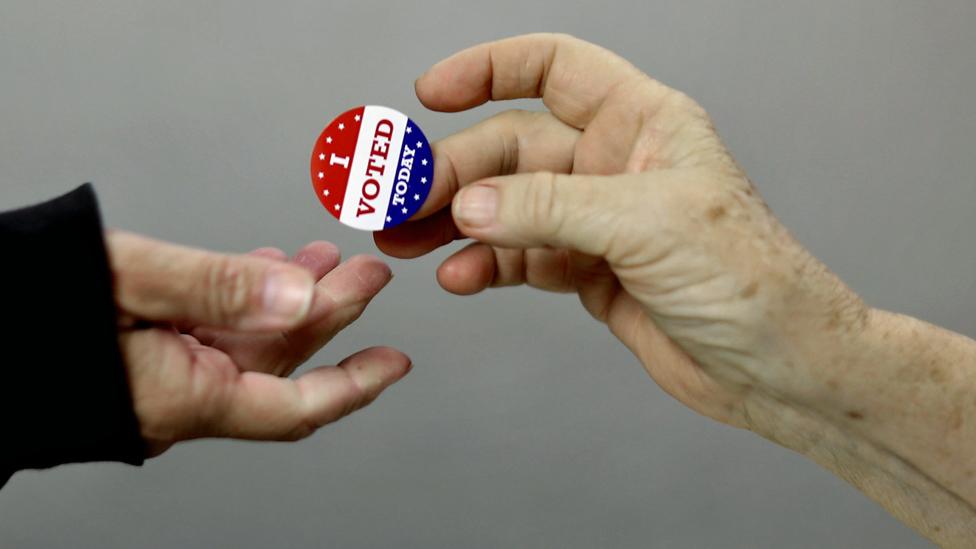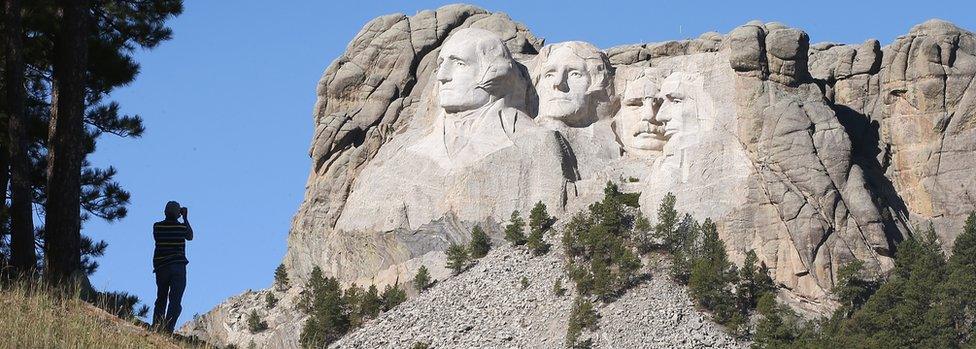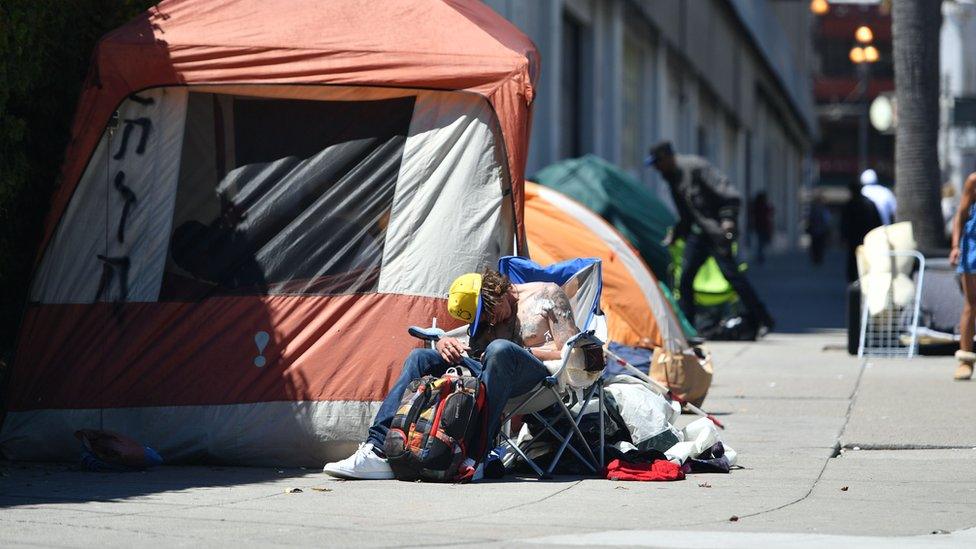US election: Marijuana, guns and condoms on voters' minds
- Published

In addition to casting their vote for a politician each election year, Americans also have the opportunity to directly vote on the issues by way of ballot initiatives, also called propositions or ballot measures.
Ballot initiatives can be brought to a vote either by the elected legislature in each state or via a public petition.
For an issue raised in a petition to make it on the ballot, it must receive a certain number of signatures - and in most states that number is based on voter turnout in the previous election year, external.
Since voter turnout in 2014 was the lowest since World War Two, it is easier this year, external for activists to gather the signatures needed to get their issue in front of voters.
With 33 state legislatures controlled by Republicans, liberal-leaning groups have turned to petitions to get issues like marijuana legalisation and increases in the minimum wage on to ballots.
Below are some of the more than 72 initiatives, external being considered by Americans this year.

Legalised cannabis

Five states (Arizona, California, Maine, Massachusetts and Nevada) are voting on the legal sale and use of cannabis. The "yes" vote is currently leading in all five states, and is widely supported by young voters, external from both major parties. Currently about 5% of Americans live in states where they can legally light up, but after November that figure could rise to 25%, signalling a possible cultural shift that could help bring an end to federal prohibition. In Arizona, the initiative has been opposed with the help of a $500,000 (£413,000) donation from a drug company, external that produces the synthetic opioid pain reliever fetanyl. Elsewhere, the pro-legalisation effort is being funded by the nascent legal marijuana industry, which already operates in four states.

Nevada energy monopoly

Nevada will vote on ending, external the state energy monopoly held by NV Energy. Las Vegas casinos have led the effort to create a competitive electricity market, due largely to the sheer amount they use. The ballot measure would allow businesses and households to choose their own electricity supplier or even produce it themselves using solar panels or windmills. Clean energy groups (including Tesla) have backed the effort, while workers unions have opposed it, claiming that it will drive up electricity costs.

Gun sale restrictions

Four states, which together contain more than 50 million Americans, will vote on significant new firearm restrictions. Polling shows that over 60% of voters in Maine approve of a law which would require background checks for all private gun sales, applying the same standard now required of licensed gun shops and dealers. Nevada will consider a similar universal background check law. In California, a proposition could create an outright ban on high-capacity magazines and require background checks for ammunition sales. And in Washington state, voters will decide if courts can authorise "extreme risk protection orders", temporarily banning individuals from owning guns - if a judge decides that they are a danger to themselves or others. Polling indicates that all four initiatives may pass, despite efforts by the National Rifle Association to prevent it. The attempt to change state laws marks a new strategy by gun-control advocates, after several attempts to pass national reforms failed.

Competing death penalty reforms

Voters reinstated the death penalty in California in 1978 by executing 13 inmates that year. Today there are nearly 750 people on the state's death row, but no executions have been held since 2006, when a federal judge placed them on hold due to concerns over the lethal injection process. One Californian judge famously said, external that "the leading cause of death on death row is old age."
In less than two weeks, Californians will vote on 17 different ballot initiatives, including two that seek to change the state's death penalty laws. Prop 62, external seeks to eliminate capital punishment and replace it with life in prison without the possibility of release. Prop 66, external supporters want to "mend, not end" the death penalty, mainly by shortening the appeal process after conviction.

Proposition Q

San Francisco residents are considering a ban on homeless encampments, some of which have grown to "tent cities" of 30-40 tent and cardboard box shelters. Prop Q was authored by Mark Farrell, a San Francisco city supervisor who told the BBC that the camps had become "the symbol of the city's homeless problem" and that they are "some of the most dangerous places you can imagine". The measure has been popular among the newly arrived tech workers of Silicon Valley, but critics say loitering is already a crime and the initiative is only intended to "give the appearance that we are doing something, external".

Porn condoms
Californian voters will decide whether condoms should be required to be worn in adult movies filmed in the state. Proposition 60 would allow any California resident to sue studios that produce pornographic films where condoms are not visible to the viewer. State safety officials already require this but it is not enforced. Adult film actors and producers complain that they were not consulted on a law regarding the regulation of their own industry. They emphasise that performers can be kept safe from AIDS through frequent testing and a preventative drug regiment. Los Angeles passed a similar law in 2012 triggering many studios to halt filming in the city. More adult films are produced in California than anywhere else in the world, meaning that the state could lose millions in taxes if the law passes and studios move elsewhere.

Universal healthcare

In an attempt to drive down costs, Colorado residents will be asked whether the state should scrap the health insurance marketplace established by the Affordable Care Act, which is more commonly known as Obamacare. Most insurance plans would be replaced if Amendment 69 passes, instead creating a state-run universal healthcare provider called ColoradoCare which would become the sole provider for most residents. If it passes, state payroll taxes will increase and elections would need to be held to assemble the 21-member board of trustees who would govern ColoradoCare. Opponents, led by insurance companies, have raised nearly four times the cash, external that supporters have. Proponents say the law will cut red tape and decrease the cost of healthcare, but opponents argue that the 21-member board will consist of "unaccountable" politicians who will make important healthcare and treatment decisions for individuals without their input. Polls show that 27% of Americans are so distrustful of the national healthcare system that they want it scrapped and completely replaced.

Minimum wage

Four states will decide in November if the minimum wage should be raised to as high as $13.50 (£11.07) per hour, but only one state is debating lowering the wage rate. Two years ago, South Dakotans raised their state minimum wage to $8.55 (£7.01), joining more than half of states who have raised their minimum wage above the federal minimum of $7.25 (£5.94) per hour. Now South Dakota is considering reducing the minimum wage, external by one dollar for residents under the age of 18. The state's Democratic party is leading the opposition to the new law, which is already in effect after being passed by the Republican legislature in March 2015. Voters in the Mount Rushmore state will be given the opportunity to repeal the law with a "no" vote. Opponents also point out that more than a quarter of the state's residents are under 18.

Plastic bags

California may become the first US state to eliminate single-use shopping bags if Proposition 67, external passes, although all of Hawaii's counties banned them in 2015. A 'yes' vote on Prop 67 will keep in place Senate Bill 270, which bans non-recyclable bags (except those used for food and perishable items) and enforces a 10 cent fee on any recyclable or compostable bags given to shoppers. Los Angeles, and 58 counties in California - as well as several other major US cities - already have a ban in place. A separate California ballot measure, Prop 65, external, dedicates that funding raised by the sale of shopping bags be donated to support environmental organisations. Currently retailers keep the money generated by the sale of recycled bags.
- Published21 October 2016
